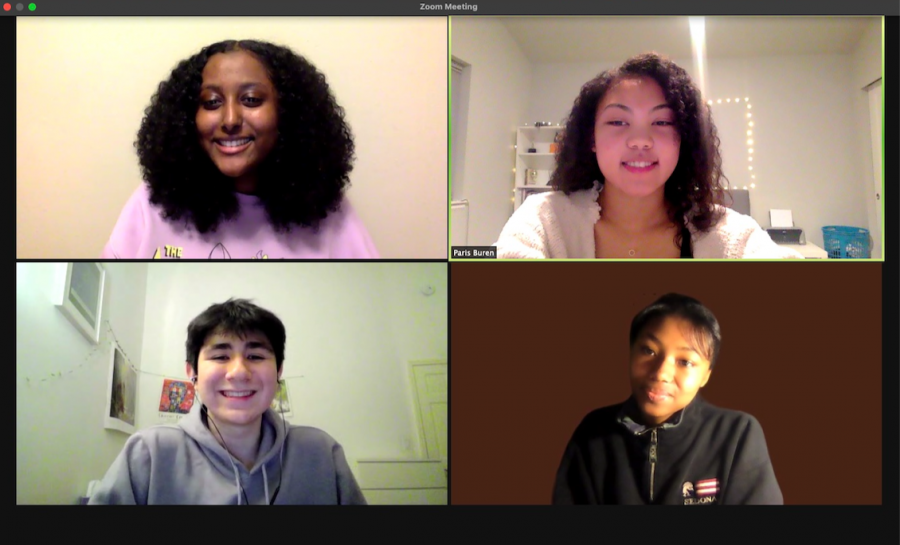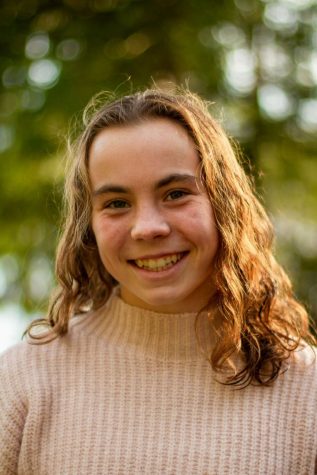Streaming Student Voices
Students create a series about race at independent schools
Photo: Hermona Hadush
POC3 hosted their second Zoom episode on Thursday, Feb. 18. Hadush, Buren, and Alobaidi invited SAAS sophomore Erin Howard (bottom right) to speak.
“Socially, [going to University Prep] is suffocating,” junior Paris Buren said. “It takes a lot of effort to put on a facade and try to not act yourself.”
Buren talked about her experience as a person of color at a predominantly white institution during her first episode of the new series POC3, standing for People of Color 3. Buren created POC3 alongside juniors Hermona Hadush and former UPrep student Kalid Alobaidi.
“It was obvious that there was a lack of diversity compared to my old school,” Hadush said during the debut episode, referring to her local elementary school just minutes from her house. “It was a culture shock not seeing anyone that looked like me.”
Buren and Hadush initially started brainstorming their idea in November.
“We just felt like—I don’t know— the people in our classes were sort of, I don’t want to say ignorant because that’s a strong word, but they didn’t fully understand people of color,” Buren said. “So [we] weren’t like, ‘We should educate white people’ or anything, [rather], ‘We should share our perspectives.’”
Hadush agrees that POC3 is an opportunity to share her own experiences and hopes it can be a similar platform to the one she found during at the Student Diversity Leadership Conference in 2019.
“At the beginning, POC3 was a way for us to be able to have a platform and share it with other people,” Hadush said.
Alobaidi, Hadush and Buren hope that their stories can help open conversations and cultivate an understanding between students at independent schools and predominantly white institutions. For example, Alobiadi, who now attends his local high school, Medowdale in Lynwood, hopes to share his experiences from his time at UPrep and information about why he chose to leave.
“I feel like there’s stuff that I’ve always wanted to discuss,” Alobaidi said. “And this is an opportunity for that. I think it’s for the betterment of everybody to just understand each other more.”
Alobaidi remembered a time during his freshman year where a white student asked him, “Why are you trying to talk Black?”
Also remembering a time when UPrep did not feel like the most welcoming place, Buren mentioned her 30 to 40 minute commute to school everyday and memories of students’ pressure about getting a driver’s license, which costs over $500 because of Washington’s drivers education requirements.
“I feel like we have so many stories like that from UPrep. I’m not saying UPrep is totally bad, but it’s not the most welcoming for students of color,” Buren said.
Alongside their personal anecdotes during the hour-long event, they talked about their first impressions of each other, their expectations of independent schools and how going to independent schools impacted them. The hosts were all very pleased with how the first event turned out, but noticed that, of the 20 attendees, most were students of color.
“I’m pleased with [the turnout], but at the same time, it was obviously majority POC,” Buren said. “It’s very interesting to see how we’re giving the non-POC students a chance to learn more about us, but they’re not taking it.”
The hosts hope to increase viewership as their series progresses.
“For future conversations we are planning on incorporating people from other affinity groups and possibly Allies Club in order to make a more relatable environment,” Hadush said.
In their second episode on Feb. 18, POC3 hosted sophomore Erin Howard from Seattle Academy, something they hope to do more of.
“One of the things [I hope for future episodes] is to include current events and share our thoughts on them,” Alobaidi said. “But it also doesn’t always have to be super serious topics.”



